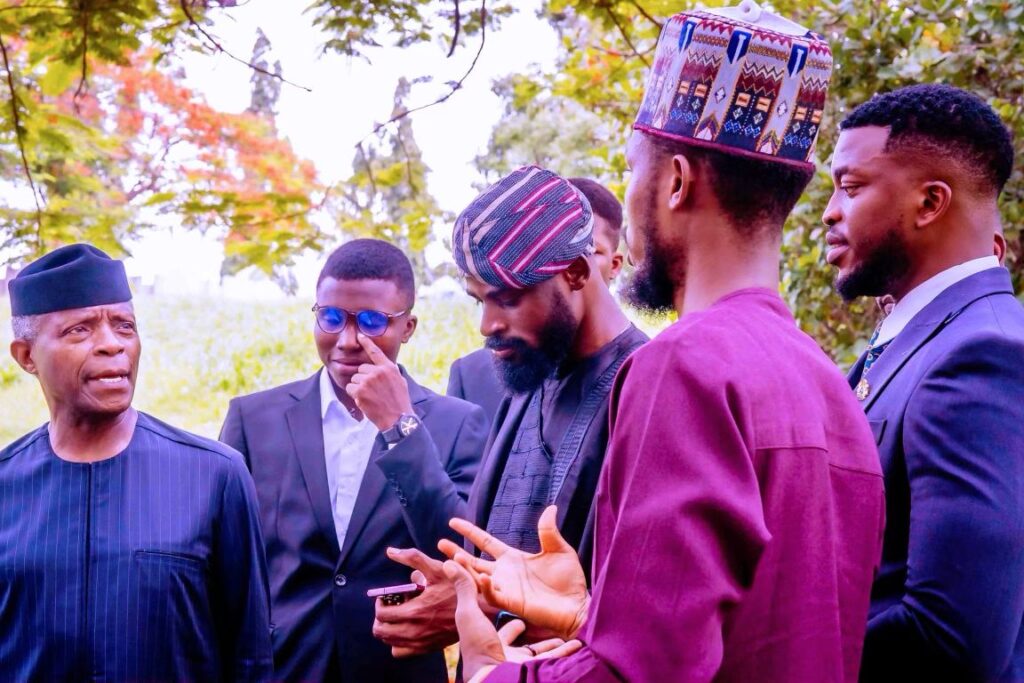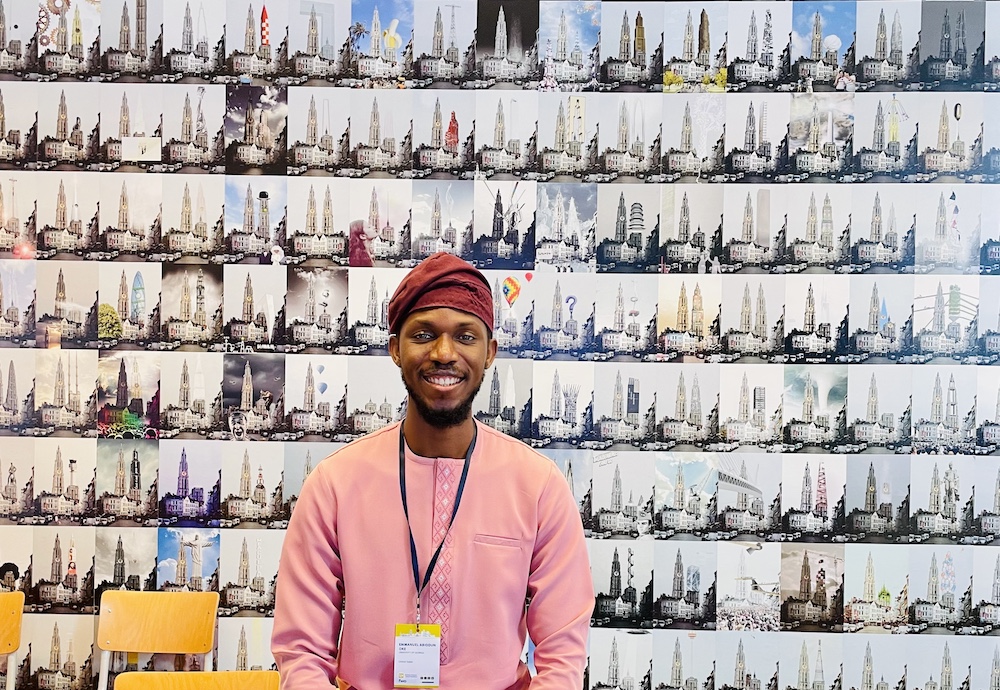A Global Game: Master’s Student Bringing Chess, Research Across The World
The UGA School of Social Work has a passion for global engagement, and master’s student Emmanuel Abiodun Oke is using his distinctive, international experiences to guide his future and impact communities across the globe.
The Lagos, Nigeria native and graduate research assistant is making the most of his opportunities from his advanced degree, presenting at international conferences, securing grants for a nonprofit organization and using his education to give back to African children as his passion for service grows.
It’s been a winding journey to Oke’s second year of graduate studies, but his work and devotion to the field serves as a culmination of his upbringing and experiences.
A Place of Empathy
Oke was born and raised in Makoko, the world’s largest floating slum located in Lagos. The community had no electricity, no hospitals and very few necessities. Although his family had little, Oke’s parents instilled values of empathy, godliness and contentment into him, attitudes that would shape his future.
“Despite the fact that we lacked, we would always give,” Oke said. “No matter how little it was, we would always give, always share with others who did not have.”
When Oke had the opportunity to attend school as a teenager, he used it to learn the material and return home to teach the exact lessons he studied to other children in the community. His educational work scaled, and Oke and a friend started a home lesson program that grew into the area’s first tuition-free school, Whanyinna School, in 2009. To date, the school has graduated more than 300 children, and it educates more than 200 children every year.
“I witnessed struggle and witnessed the pain of lack and poverty,” Oke said. “There are over tens of thousands of out-of-school children in my community as well. My journey to social work started pretty early, right from my community.”
Oke continued his education, earning a degree from Nigeria’s first University, University of Ibadan, before starting advocacy work. As he continued his professional career, he worked in a number of roles in the energy and healthcare sectors, but the COVID-19 pandemic shifted his focus. As schools closed, Oke witnessed the effect that the virus had on learning in his home community, and he sought to provide solutions to infrastructure-related issues made worse by the pandemic.
“We cannot afford the luxury of online learning,” Oke said. “Around that time, I became so troubled that I resigned from my job. It turns out that would be one of the best decisions of my life.”
With the help of a New York-based nonprofit, SheBuildsLives, Oke coordinated a program that sent FM radios to children in Nigeria, which allowed them to continue to learn and study despite physical distancing. This work reconnected him with education, and it reignited a passion to serve his local community.
Chess as a Continental Connector

Emmanuel and the founder of Chess in Slums, Tunde Onakoya, discussing what the organization does with the Vice President of Nigeria at his VP Lodge in Abuja
Today, Oke is the Chief Operations Officer of Chess In Slums Africa, a nonprofit organization seeking to empower, uplift and educate children in slum communities through the game of chess. He joined as a volunteer and later was hired as an operations manager in 2021 thanks to connections he made with his work in education during the pandemic, and his more than three years with the organization have informed his research and future.
Chess In Slums Africa uses the game of chess as a tool to reach marginalized youth to further their education, both on the board and in the classroom. The organization challenges existing implications of the game to promote growth.
“The game is a game of the nobles, it’s the game of the intellectual,” Oke said. “(Chess) has an intellectual connotation that comes with it, and it is touted to be something meant for the brightest minds of all. We use this game as a framework to teach these children and train them intensively so that they come to learn the game and unleash the grandmaster within them. A child in the most dreaded part of Lagos can now unleash their potential, and it gives them a new identity.”
In his current role, Oke oversees various programs, writes grants and creates new initiatives for children. Chess In Slums Africa has more than 10,000 beneficiaries across more than 30 African nations, and a current initiative to distribute 50,000 chess sets across the continent, in collaboration with the Gift of Chess, a New-York based nonprofit, ensures that those numbers will continue to grow.
Recently, Oke secured a €100,000 (approx. $109,261) grant from Lufthansa Group’s’ “l Help Alliance.” The grant will run from 2024 to 2027 and be used to build a chess academy and STEM innovation lab in Lagos in addition to providing educational opportunities for more than 2,000 underprivileged children in Nigeria. The funding will open doors for educational scholarships and vocational support as well as a new mentorship program for children.
Chess might be the means, but the end of Oke’s work is to create productive, active and responsible citizens for society.
“For me, this social impact is not a role; it is a calling,” Oke said. “I am committed to uplifting and empowering marginalized children and families, ensuring we create a brighter future where everyone can maximize their potential.”
A Worldwide Spread
While Oke’s work with Chess In Slums Africa provides him with first-hand knowledge of the nonprofit sector, additional research with professor Kristina Jaskyte on the organization and capacity of nonprofits in Africa has further informed his perspective.
Oke showcased his understanding at the 16th International Conference of the International Society for Third Sector Research, a conference promoting research and education in the fields of civil society, philanthropy and nonprofit work. Held at the University of Antwerp in Belgium, his presentation, “Chess as Social Work Activism in Rural Africa: A Case Study of Chess in Slums Africa,” was included in the conference’s activism and social justice in social work.
This presentation centered around the potential that chess, an inexpensive and accessible activity, can have as a catalyst for social change and community development in marginalized communities. Oke drew from the Community Empowerment Theory and Ecological Systems Theory to investigate how interventions based around the activity can enhance individual capabilities and communal well-being.
“The goal was to showcase our work at Chess In Slums Africa,” Oke said of his first academic conference. “I realized that choosing the UGA School of Social Work remains one of the best decisions of my life because I was the only master’s student presenting in the primary session. This is a milestone I will always cherish.”
In May, Oke explored the intersection of chess and technology within the context of fundraising and social impact at the GITEX Africa Conference in Morocco. His presentation highlighted how Chess In Slums Africa leverages opportunities for marginalized children, and he connected with industry experts while discussing strategies with attendees.
Closer to home, Oke interns with the East Athens Development Corporation, participating in grant work and other programs while contributing to the Center for Social Justice and its StoryCorps projects. The Microsoft Global Nonprofit Leader Summit invitee stays busy, but no matter where his work takes him, he keeps service at the top of mind.
“In the grand scheme of things, the true measure of success, the true measure of our greatness can only be found in the hearts we touch and the lives we impact,” Oke said.

